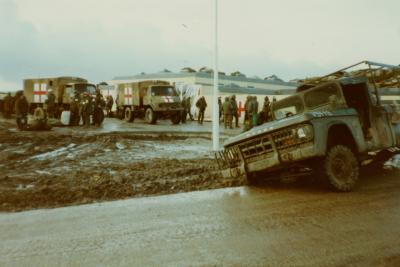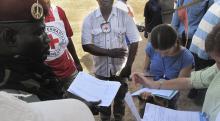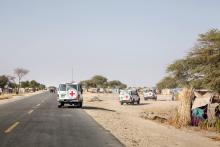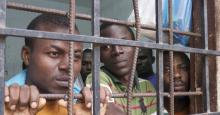Basic international humanitarian law (IHL) rules applicable to this situation:
Attacking persons who are recognized as hors de combat is prohibited. Persons hors de combat include anyone who is defenceless because of unconsciousness, shipwreck, wounds or sickness.
Civilians and persons hors de combat must be treated humanely.
Whenever possible, and particularly after an engagement, each party to the conflict must, without delay, take all possible measures to search for, collect and evacuate the wounded, sick and shipwrecked without adverse distinction.
The wounded, sick and shipwrecked must receive, to the fullest extent practicable and with the least possible delay, the medical care and attention required by their condition. No distinction may be made among them founded on any grounds other than medical ones.
The case in brief
In 1982, armed conflict broke out between Argentina and Great Britain over control of the Falkland Islands/Islas Malvinas, resulting in casualties on both sides.
In accordance with British medical support plans, British military medical personnel provided prompt and comprehensive medical treatment for wounded British and enemy combatants, based on medical need alone. The training provided to the medical teams and the proximity of medical support units to the fighting units helped enable these acts of compliance with IHL.
IHL compliance highlights
- In line with British medical support plans, field surgical units manned by highly trained field medics were positioned close to the front line as it advanced, enabling them to provide appropriate treatment to wounded combatants, regardless of their allegiance, with minimal delay. When field surgical units were overwhelmed, casualties were transferred to a British hospital ship to ensure they received adequate treatment.
- British medical personnel arranged for Argentinian prisoners of war to donate blood for Argentinian wounded requiring transfusions. The blood stocks were carefully labelled and stored, adopting the same method used for blood stocks donated by and for British soldiers.
- One British Royal Navy surgeon received Argentina’s highest order of merit in recognition of his impartial treatment of combatants from both parties to the conflict.
Case prepared by David Jordan and Sai Santosh Kolluru, J.D. students at Emory University School of Law, under the supervision of Professor Laurie Blank, Emory University School of Law.
A.THE MEDICAL PLANNING FOR THE FALKLANDS/MALVINAS ISLANDS CAMPAIGN
[Source: Thomas E. Broyles, A comparative analysis of the Medical Support in the Combat Operations in the Falklands Campaign and The Grenada Expedition, Sept. 21, 1987, available at https://apps.dtic.mil/sti/pdfs/ADA184721.pdf]
[…]
According to British medical operational concepts, highly trained field medics were to accompany each combat unit to provide treatment beyond the average soldier's capability. […]Also, field surgical teams (consisting of a surgeon, anaesthetist, resuscitation officer, four operating theatre technicians, a blood transfusion technician and a clerk) were to be placed as far forward as possible, moving successively forward with the casualty collecting sections from the field ambulance as the combat units and the aid posts advanced.
From the outset the British medical planners sought to ensure that the medical support plans conformed to the operational and tactical plans. Similarly, they planned medical support in the closest possible proximity to combat operations using significant medical resources at every echelon to insure rapid resuscitation and treatment. The flexibility which the planners displayed has been shown in their ability to quickly adjust and "hot plan" as the campaign evolved. The mobility of the medical units was expected to be severely hampered due to the nature of the terrain, but the medical planners hoped to mitigate this by situating their medical units well forward with the manoeuvre units. Continuity of care was also emphasized from the beginning of planning but the British also recognized their complete reliance on stretchers and helicopters for casualty evacuation (casevac). Finally, in their medical support doctrine, they recognized the importance of control of medical units to insure effective, efficient support.
B. FALKLANDS/MALVINAS: ARMY FIELD SURGICAL EXPERIENCE
[Source: D.S. Jackson, C.G. Batty, J.M. Ryan, and W.S.G. McGregor, The Falklands War: Army Field Surgical experience, 65 Annals of the Royal College of Surgeons of England 281 (1983), available at https://www.ncbi.nlm.nih.gov/pmc/articles/PMC2494365/pdf/annrcse01521-0003.pdf ]
In the recent Falklands campaign four Army Field Surgical Teams were deployed in the two phases of the war.
[…]
Sited as they were on East Falkland, the four Army Teams functioned as Advanced Surgical Centres. This was necessary because of the manner in which the battle was conducted and the difficult terrain. Surgical facilities further to the rear would have posed insurmountable problems in casualty evacuation as helicopters were in short supply, had a limited load carrying capacity and many had no night flying capability.
Argentinian casualties presented a significant group and it is sad that we have no information on their fate. Most were transferred to Argentinian Hospital Ships from SS Uganda.
The final common pathway for all our cases was to the hospital ship SS Uganda. We are very grateful to our colleagues of the Royal Navy who ran this floating hospital, and who absorbed casualties directly when the Advanced Surgical Centres were overwhelmed, particularly for example with the burn cases after the Bluff Cove bombing. Without them the Advanced Centres would have been flooded and thus rendered relatively ineffective.
C. FALKLANDS/MALVINAS WAR HOSPITAL TREATMENT OF VICTIMS
[Source: Colonel Charles G. Batty, MBE L/RAMC, Changes in the Care of the Battle Casualty: Lessons Learned from the Falklands Campaign, 164 Military Medicine 336 (1999).] available at https://academic.oup.com/milmed/article-pdf/164/5/336/24221270/milmed-164-5-336.pdf ]
On May 21, 1982, an unused slaughterhouse and meat processing plant was taken over [by British Forces] at Ajax Bay on the southern shore of San Carlos Water. […] This was to become the advanced surgical center (ASC).
In the middle of the building were two smaller rooms containing many girders and rails from which the animal carcasses used to hang. These rooms were considered to be the safest and so became the operating theaters […].
[…]
Initial stocks of blood (for transfusions) were obtained from the soldiers about 1 week before the landings. Because it was not possible to run a cross-matching service aboard ship, the donated blood was stamped with the donor's blood group, obtained from his identity disc, and stored. It was taken ashore in insulated containers and buried in the ground to keep it at the optimum temperature. Resupply came from the base area troops. The Argentinian prisoners of war donated their blood for their wounded. It was cross-matched by the same method so that group-compatible blood could be transfused as required. The Argentinian wounded were treated the same as our own troops, in accordance with the Geneva Convention.
D. THE BRITISH MILITARY DOCTOR WHO TREATED MANY ARGENTINIAN COMBATANTS
[Source: Murió el hombre que salvó cientos de vidas argentinas e inglesas en la guerra de Malvinas, Infobae (17 enero 2018) available at https://www.infobae.com/america/mundo/2018/01/17/rick-jolly-murio-el-hombre-que-salvo-cientos-de-vidas-argentinas-e-inglesas-durante-la-guerra-de-malvinas/]
Honoured by the UK and Argentina alike, Captain Richard “Rick” Jolly, a Royal Navy surgeon, saved the lives of hundreds of combatants on both sides of the Falklands War.
[…]
The conditions in which Captain Jolly worked during the war were extreme. He was forced to set up a makeshift field hospital in a derelict mutton-processing plant in Ajax Bay, where he carried out many operations, saving the lives of hundreds of Argentinian and British combatants alike. He nicknamed the facility “The Red and Green Life Machine”, on account of the colour of the berets worn by the marines and paratroopers treated there.
In a television interview for ITN during the war, the bearded captain said, “We hope always in war that we’re never busy at all.” Around 30 per cent of the wounded picked up on the battlefield and taken to the hospital for surgery were Argentinians, who Captain Jolly and his medical team treated in the same way as the British.
In addition to his work as a doctor, Captain Jolly was hailed for his bravery in combat. When Argentinian aircraft bombed HMS Ardent, he boarded a helicopter that lowered him into the freezing waters of Grantham Sound, where he plucked two wounded sailors from the sinking ship.
“I hadn’t intended to go for a swim,” he said with typical irony. “I dropped into the water and I was too weak to lift him. He was in a terrible state, with a huge gash in his head and blood all over his face. He was in such a bad state, I’m not even sure he was aware he’d been saved.”
[…]
In 1983 he was made an officer of the Order of the British Empire in recognition of his achievements in the Falklands; in 1999 his former enemies bestowed on him the Orden de Mayo, Argentina’s highest distinction. The ceremony took place in Buenos Aires, and was attended by Prince Charles and several soldiers Captain Jolly had saved during the war.
E. FALKLANDS ANNIVERSARY: ‘WE TREATED MORE ARGENTINES THAN BRITS’
[Source: BBC News, Falklands anniversary : ‘We treated more Argentines than Brits’ , May 2012, available at https://www.bbc.com/news/uk-17535607]
"We probably dealt with about as twice as many Argentines as we did Brits," says Steven Hughes, then the Regimental Medical Officer with 2 Para.
"The ethics of treatment of the enemy on the battlefield you can argue back and forth but under the Geneva Convention and the principles of Hippocrates you treat every individual on the merit of their wounds and not on who they are fighting for and fighting against," he says.
"Once I'd started treating casualties professionally and treating the Argentines in exactly the way of our own, then my medics started to do the same.”
Discussion
I. Classification of the Situation and Applicable Law
1. How would you classify the situation between Argentina and the United Kingdom in 1982? Was there an armed conflict? What was the law applicable to the situation? (GCI-IV, Art. 2)
II. Treatment of Enemy Wounded in the Falklands/Malvinas Conflict
2. What are the obligations owed to the wounded and sick by the parties to an armed conflict? What is the standard of care that they are entitled to? Does IHL envisage the evacuation of the wounded and sick from the battlefield? (GCI, Art. 12, 15; PI, Art 10; CIHL, Rules 47, 87, 109, 110)
3. Under what circumstances is an individual considered ‘wounded’ under IHL? Can a distinction be made between civilians and combatants? Between own and enemy combatants? Does IHL allow the parties to the conflict to give priority to their own soldiers in the provision of medical care? Is adverse in the distinction in the delivery of medical care to the wounded prohibited under IHL? What is the status of wounded combatants who fall into the hands of the enemy? (GC I, Arts 12, 13, 14; P I, Art. 8)
4. (Document B)Was the British Navy required to transfer wounded Argentinian soldiers to Argentinian hospital ships? (GCIII, Art. 109) (GCIII, Art. 110)
III. Elements Contributing to Respect for IHL
5. (Document A) How is the deployment of highly trained medics relevant? What role does military and medical training play in fulfillment of provisions relating to medical treatment ?
6. (Documents A, B and C) Do you think the fact that medical teams were deployed close to hostilities facilitated the treatment of combatants from both sides of the conflict?
7. (Document D) Why is it important for compliance with IHL that both governments pay tribute to the war surgeon through official ceremonies? Could these diplomatic actions have an impact on future actions of compliance?





